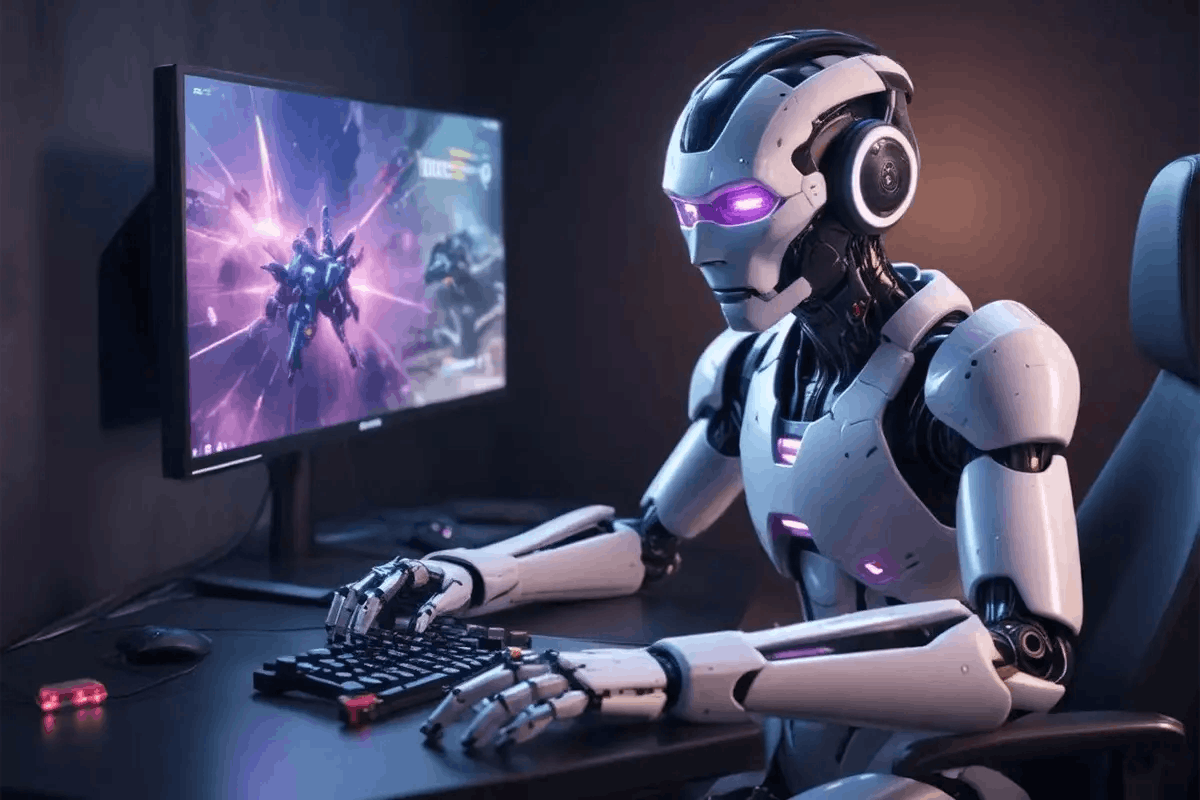


Games of late have changed radically mostly due to machine learning (ML) innovations. The significant part played by machine learning (ML) in game development should be noticed when we are talking about the transformations in gaming in recent years. That's because today it is a must that each game developer applies ML in his or her game helping to make the game more attractive and easier.
This article aims to explore the practical effects of machine learning in gaming which is transforming an industry in various ways. ML in game development can make the game content smart enough to keep pace with the actions of players and also adapt to what they like. As current technology continues to develop, the more advanced machine learning in the gaming industry will open the doors for something truly wonderful such as combining the virtual world with the real one.
One of the applications of machine learning in game development that has taken the most precedence is the realization of new functionality in the form of non-player characters (NPCs) that possess superior intelligence. NPCs refer to the characters played by the game and controlled by the software of the game. They interact with the players offer challenges or quests and tell the storyline throughout the game.
In many cases, ordinary game characters frequently appeared based on a pre-written script, generating repetitive and familiar patterns that are easy to predict. With the advent of machine learning, players now enjoy the game more as the intelligent game characters can adjust their actions and decisions just as a real person can do according to the game conditions and game circumstances. This enables an open environment and dynamic interaction between players and game characters.

Developing a game can be a very time and resource-consuming process, mainly in the case of creating an enhanced and engaging game. Among the various innovations are Procedural Content Generation(PCG) techniques where developers utilize machine learning in game developments to create game levels, environments, quests, and additional in-game assets autonomously.
Moreover, even though it can save development time and costs dramatically, the process of creating an absolute game session is generated by PCG each time. Integrating ML in gaming development models can analyze game content that is already created, as well as player behaviors and gameplay feedback data, and then make new content keeping in mind the style and design of the game.
Game developers rely on assessing the behavior and habits of each gamer. Their goal is to enable them to be fully involved, improve the chance of buying content, and provide them with the best possible gaming experience. A large amount of player data can be gathered from the actions, preferences, and purchasing habits of the gamers, which can be made sense of with the help of the analysis machine learning algorithms carry out.
Insights gained can become important sources to guide the developers to concepts like the integration of features like bonuses by personalizing the game, suggesting in-game content or in-game purchases, and identifying potential areas for improvement or new features. Also, by utilizing player behavior analysis, game developers can evaluate cheating and minimize cheating or exploits, giving a fair and enjoyable playing environment to all players.
Machine learning algorithms are incredibly useful for game testing because they can process and analyze large amounts of data very quickly. These advanced ML gaming applications can look for specific patterns or anomalies in the game data that may indicate a bug or performance issue. They can test the game on many different hardware configurations and platforms to ensure compatibility across various systems. By using machine learning for testing, game developers can catch and fix problems more efficiently before releasing their games to players.
Making games look and move like real life is very important for helping players feel like they are really inside the game world. Machine learning in game development can help make game graphics better in many ways. These programs can take simple, low-quality images and make them look super detailed and realistic. They can add tiny details like leaves on trees or lines on buildings to make the game environments seem more life-like. Machine learning in the gaming industry can also create smooth, natural animations for character movements, like walking or fighting.
Using ML in Gaming innovations to improve game visuals can save lots of time and work for the artists and animators who create game content. Instead of having to draw or animate every tiny detail by hand, computer programs can handle much of that work automatically. This advanced technology can generate highly realistic visuals almost as well as a human artist. At the same time, machine learning systems can also help games run smoothly on different computers and devices by carefully managing how system resources like memory and processing power are used. This ensures players have an excellent experience whether they are using a high-end gaming PC or an older laptop.
Games are becoming more lifelike and fun due to natural language processing (NLP) and conversational AI. These technologies let players chat with characters in a very human-like way. ML in gaming innovations understand what players say and respond with realistic dialogue. This enables dynamic storytelling where conversations flow naturally.
NLP also powers in-game features. Players can use voice commands to interact with the game. Quest objectives are tracked so players don't get lost. And NLP assists when needed, making games easier to play for everyone. Conversational AI virtual assistants and chatbots guide players, share tips, and offer customer support too. Understanding players' words, they can have back-and-forth conversations just like talking to a real person.
Machine learning technology has transformed the gaming world, making games more engaging, adaptable, and life-like for players. It enables games to create intelligent non-player characters (NPCs) that act and respond like real beings. ML algorithms can generate new game content automatically, tailoring the experience for each player. By studying how players behave, games can adjust their difficulty and challenges to keep things exciting. ML also powers realistic graphics with stunning visuals that make virtual environments seem almost tangible. Game developers rely heavily on machine learning techniques throughout the entire creation process.
As computers and software continually advance, the gaming community can look forward to even more advanced applications of machine learning in game development.
Codiste is a leading AI development company creating unique development solutions that are available across different industries, with one such solution being gaming. Studios and publishers of computer games can use the power of ML and AI to boost the quality of their respective games with the support of a team that comprises some of the best ML game developers and machine learning specialists in Codiste. They train their experts in ML and gaming which makes them capable of creating an environment in the game that players can feel and relate to, hence, can make them succeed in a fast-evolving game market.




Every great partnership begins with a conversation. Whether you’re exploring possibilities or ready to scale, our team of specialists will help you navigate the journey.